#Shahab Hosseini
Text


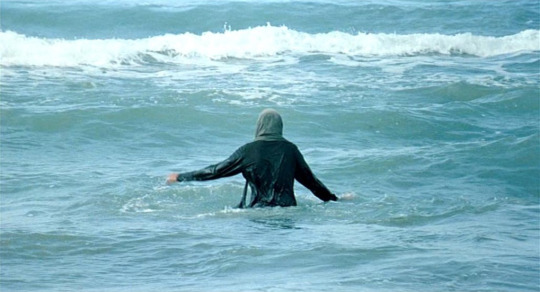
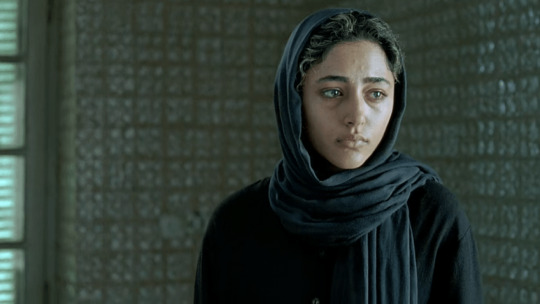
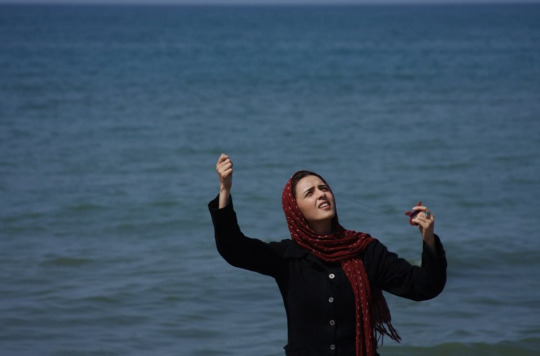

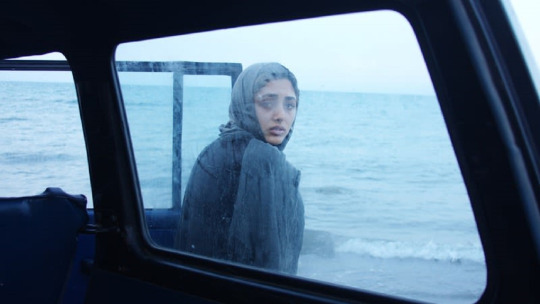
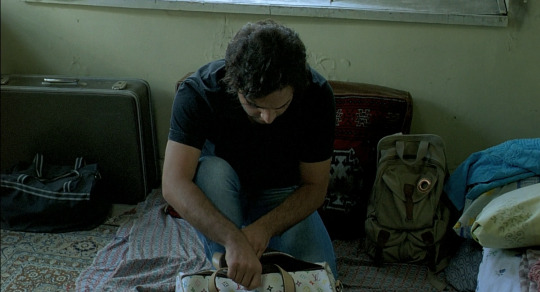

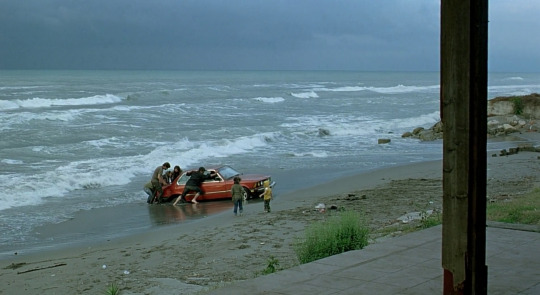
ABOUT ELLY | درباره الی (dir. Asghar Farhadi, 2009)
#asghar farhadi#cinema#actors#film stills#movie stills#about elly#iranian actors#iranian cinema#persian#iranian movie#taraneh alidoosti#shahab hosseini#golshifteh farahani#films#persian actors#middle eastern cinema#middle eastern
43 notes
·
View notes
Photo
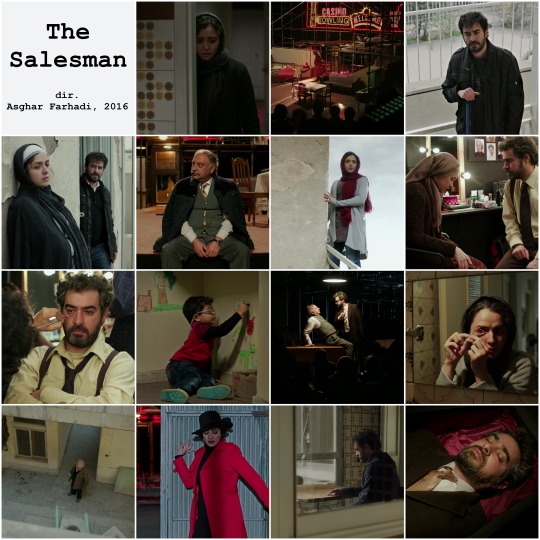
The Salesman
directed by Asghar Farhadi, 2016
#The Salesman#Asghar Farhadi#movie mosaics#Taraneh Alidoosti#Shahab Hosseini#Babak Karimi#Sam Valipour#Farid Sajadhosseini#Mina Sadati
8 notes
·
View notes
Text
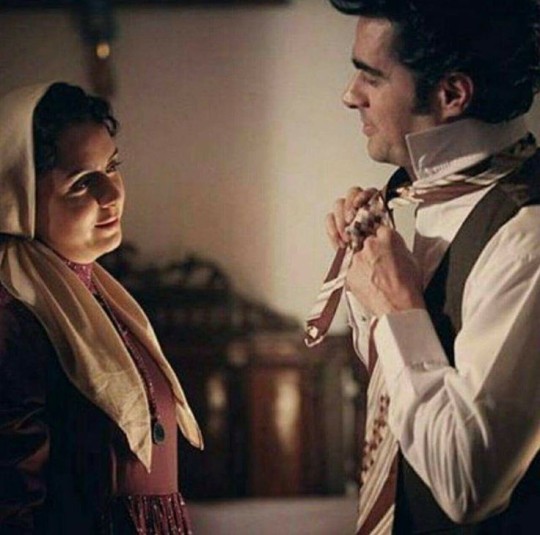
#shahrzad#hassan fathi#1950s#1953#iran#taraneh alidoosti#shahab hosseini#not mine#nazli asgharzadeh#golzar bahrami#inspired
5 notes
·
View notes
Photo

Shahab Hosseini and Taraneh Alidoosti in About Elly (Asghar Farhadi, 2009)
Cast: Golshifteh Farahani, Shahab Hosseini, Taraneh Alidoosti, Merila Zare'i, Mani Haghighi, Peyman Moaadi, Ra'na Azadivar, Saber Abar. Screenplay: Asghar Farhadi, Azad Jafarian. Cinematography: Hossein Jafarian. Production design: Asghar Farhadi. Film editing: Iman Rahimi, Hayedeh Safiyari. Music: Andrea Bauer.
Sepideh (Golshifteh Farahani) invites the unmarried Elly (Taraneh Alidoosti), one of her daughter's teachers, to spend a three-day weekend with her, her husband, and two other couples and their children, at a villa overlooking the Caspian Sea. Also joining the group is the recently divorced Ahmad (Shahab Hosseini), who is taking a vacation from his job in Germany. Because of the Islamic Republic's prohibitions against unmarried men and women traveling together, Sepideh persuades the group to pretend that Elly and Ahmad are newlyweds, a lie that begins to backfire when the managers of the seaside property want to celebrate the young couple's marriage. Embarrassed by the attention, Elly decides to leave after the first night, which Sepideh, set on her matchmaking, tries to prevent. Writer-director Asghar Farhadi sets all of this up carefully, so that the story could easily turn toward comedy. It doesn't. When the young son of Shoreh (Merila Zare'i) and Peyman (Peyman Moaadi) almost drowns, Elly disappears during the chaos of his rescue and resuscitation. Has she drowned trying to rescue the boy, or has she made good on her determination to return to Tehran? Sepideh is particularly frantic when Elly's disappearance is noted, plunging into the sea to try to find her. It's then that we begin to discover that Sepideh knows a great deal more about Elly than she has told the others, and a great snarl of complications develops, especially when the group begins to create more stories to tell the police, the property managers, and Elly's family. The performances of the cast -- some of whom, like Moaadi, Zare'i, and Hosseini, will be familiar from Farhadi's 2011 Oscar-winning A Separation -- are uniformly brilliant, and Farhadi's script and direction result in a film that is both suspenseful and morally complex. The film has a subtext of criticism directed at the Iranian government, under which people routinely dissemble in order not to bring censure upon themselves -- especially the young professionals like the ones in the film. Is it significant that the last scene of the movie shows the group trying to free a red BMW from the sand in which it has bogged down?
9 notes
·
View notes
Photo

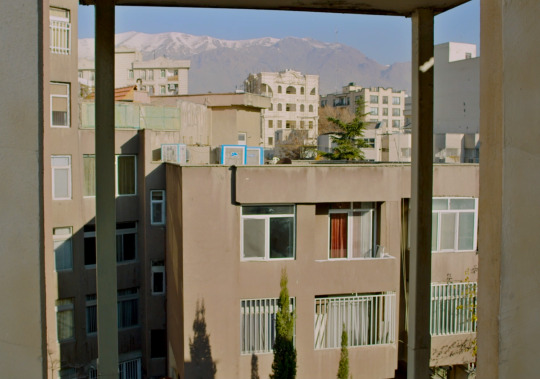
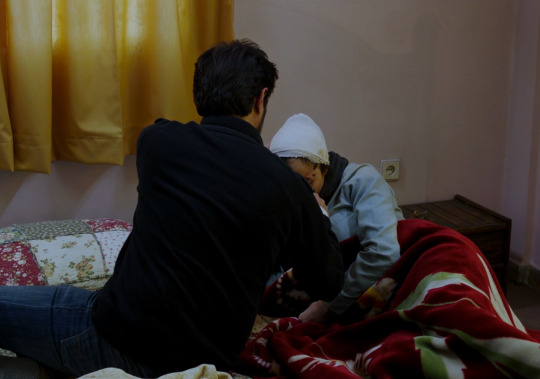
The Salesman (فروشنده) dir. Asghar Farhadi
36 notes
·
View notes
Text
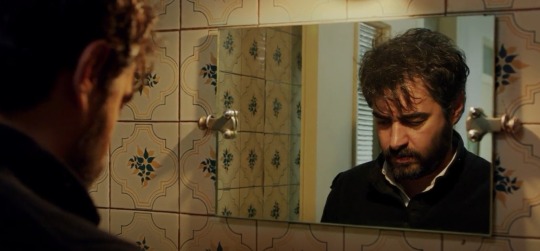

"Bazen, sanki ben hiç yokmuşum gibi yanımdan geçiyorlar, sanki kimse beni görmüyor, hiç kimse beni fark etmiyor, hiç kimse."
#the salesman#forushande#iran sineması#iran#taraneh alidoosti#shahab hosseini#gecenin sabahi#gecenin-sabahi
2 notes
·
View notes
Text
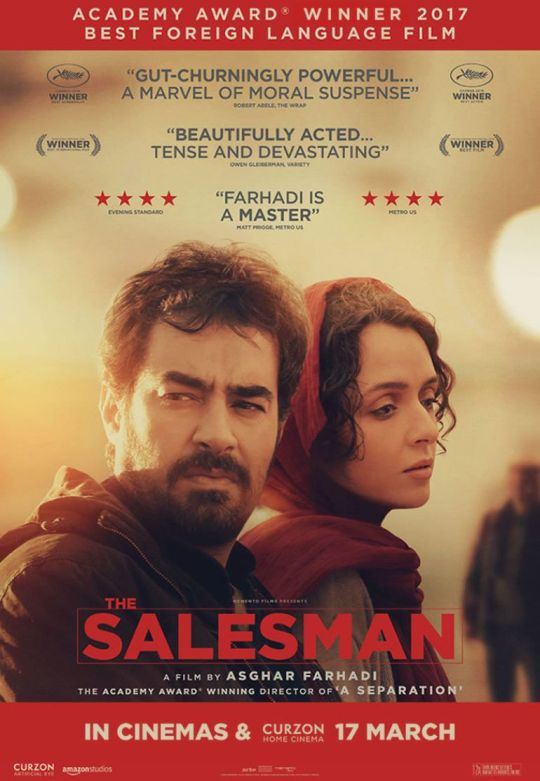
The Salesman (2016)
Directed by Asghar Farhadi.
Starring Shahab Hosseini, Taraneh Alidoosti, Babak Karimi, Sahra Asadollahi, Medhi Koushki.
Genre: Drama, thriller.
#The salesman#asghar farhadi#Shahab hosseini#taraneh alidoosti#Babak karimi#Sahra Asadollahi#Medhi Koushki
0 notes
Text
Bayram kahvaltısını yalnız yapmak zorunda kalanlar derneği genel başkanıyım.
24 notes
·
View notes
Note
3, 6, 10, 22, 24, 27, 28
3. Any old school favorites (pre-70s)?
A very broad question. To mention some:
"Shanghai Express" dir. Josef von Sternberg
"The House Is Black" dir. Forough Farrokhzad
"Cléo from 5 to 7" dir. Agnès Varda
"The Trial" dir. Orson Welles
"The Hitch-Hiker" dir. Ida Lupino
"The 400 Blows" dir. François Truffaut
"Rocco and His Brothers" dir. Luchino Visconti
"The Red Shoes" dir. Michael Powell and Emeric Pressburger
"The Third Man" dir. Carol Reed
"Double Indemnity" dir. Billy Wilder
"Ajantrik" dir. Ritwik Ghatak
"Bicycle Thieves" dir. Vittorio De Sica
"Pather Panchali" dir. Satyajit Ray
"Viridiana" dir. Luis Buñuel
"Accattone" dir. Pier Paolo Pasolini
"Black Girl" dir. Ousmane Sembène
"Uski Roti" dir. Mani Kaul
"Black God, White Devil" dir. Glauber Rocha
"I Am Cuba" dir. Mikhail Kalatozov
"The Hand" dir. Jiří Trnka
"The Fireman's Ball" dir. Miloš Forman
"Daisies" dir. Věra Chytilová
"Meditation on Violence" dir. Maya Deren
"The Battle of Algiers" dir. Gillo Pontecorvo
"Andrei Rublev" dir. Andrei Tarkovsky
"Shadows of our Forgotten Ancestors" dir. Sergei Parajanov
"Boy" dir. Nagisa Oshima
"Persona" dir. Ingmar Bergman
"Love and Crime" dir. Teruo Ishii
"The Insect Woman" dir. Shōhei Imamura
"La perla" dir. Emilio Fernández
"Cairo Station" dir. Youssef Chahine
"Throne of Blood" dir. Akira Kurosawa
"Touch of Evil" dir. Orson Welles
"Paper Flowers" dir. Guru Dutt
"The Passion of Joan of Arc" dir. Carl Theodor Dreyer
"A Page of Madness" dir. Teinosuke Kinugasa
"Tokyo Story" dir. Yasujirō Ozu
"Chikamatsu Monogatari" dir. Kenji Mizoguchi
"Les Enfants du Paradis" dir. Marcel Carné
"La Grande Illusion" dir. Jean Renoir
"Bringing Up Baby" dir. Howard Hawks
"Rome, Open City" dir. Roberto Rossellini
"City Lights" dir. Charlie Chaplin
"Monsieur Hulot's Holiday" dir. Jacques Tati
"Sunset Boulevard" and "Some Like It Hot" dir. Billy Wilder
6. Favorite movie from the 90’s?
Some of them:
"The Apple" dir. Samira Makhmalbaf
"Crows" dir. Dorota Kędzierzawska
"A Moment of Innocence" dir. Mohsen Makhmalba
"And Life Goes On" dir. Abbas Kiarostami
"The Piano" dir. Jane Campion
"Days of Being Wild" dir. Wong Kar-wai
"Irma Vep" dir. Olivier Assayas
"Vive L'Amour" dir. Tsai Ming-liang
"Humanité" dir. Bruno Dumont
"Beau travail" dir. Claire Denis
10. Favorite animated movie?
Already answered this.
22. Favorite Disney movie?
"The Lion King"
24. Movie that makes you cry every time?
"Call Me By Your Name"
"Brokeback Mountain"
"Portrait of a Lady on Fire"
"Aimée & Jaguar"
"The Farewell"
"My Sister's Keeper"
among others.
27. Top 5 actors?
Tony Leung Chiu-wai
Shahab Hosseini
Marcello Mastroianni
Song Kang-ho
Jean-Louis Trintignant
28. Top 5 actresses?
Cruel question, but I'll go with:
Isabelle Huppert
Setsuko Hara
Smita Patil
Anna Magnani
Hedieh Tehrani
11 notes
·
View notes
Text
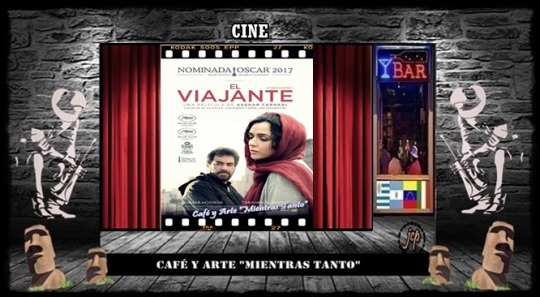
CINE
El viajante (2016)
Título original: Forushande (The Salesman)
Irán
Dirección: Asghar Farhadi
Idioma: Doblada al Español
Atención: Solo para ver en PC o Notebook
Para ver el Film pulsa el Link:
https://artecafejcp.wixsite.com/escenario-cafejcp/post/el-viajante-2016
Reparto: Shahab Hosseini, Taraneh Alidoosti,
Babak Karimi, Mina Sadati
Género: Drama
SINOPSIS:
Emad y Rana deben dejar su piso en el
centro de Teherán a causa de los trabajos
que se están efectuando y que amenazan el
edificio. Se instalan en otro lugar, pero
un incidente relacionado con el anterior
inquilino cambiará dramáticamente la vida
de la joven pareja.
Crítica:
"Es una pieza de una perfección casi humillante, puesto que, precisamente,
de eso trata, de la humillación. (…) Farhadi vuelve a recuperar su caligrafía existencial, humana y herida de sus mejores trabajos."
-Luis Martínez: Diario El Mundo
"Farhadi describe todo esto de forma sutil, consciente de la complejidad del ser humano (…) Siempre sales tocado en su cine. Y deja poso. Te perturba lo que te ha contado, su lenguaje es de primera clase."
-Carlos Boyero: Diario El País
"Farhadi vuelve a confirmarse como un orquestador único de situaciones que (…) usando simples diálogos y sutiles gestos llenos de significado, [hacen] que el corazón se nos salga por la boca"
-Nando Salvá: Cinemanía
Premios:
2016: Premios Oscar: Mejor película de habla no inglesa
2016: Globos de Oro: Nominada a Mejor película de habla no inglesa
2016: Festival de Cannes: Mejor actor (Shahab Hosseini) y guión
2016: National Board of Review (NBR): Mejor película de habla no inglesa
2016: Critics Choice Awards: Nominada a Mejor película de habla no inglesa
2016: Festival Internacional de Valladolid - Seminci: Sección oficial
2016: Satellite Awards: Mejor película de habla no inglesa
2017: Premios BAFTA: Nominada a Mejor película en habla no inglesa
2017: Premios Guldbagge (Suecia): Mejor film extranjero
Café Mientras Tanto
jcp
0 notes
Text

شهاب حسینی و همسر جدیدش در اکران فیلم مقیمان ناکجا + عکس https://www.coolaks.com/shahab-hosseini-moghiman-nakoja/
0 notes
Text
Interdependent Elements: An Interview with Iranian Film Editor Haideh Safiyari
By Ali Moosavi.
When it comes to Iranian cinema, those aficionados of world cinema will probably be familiar with the names of Abbas Kiarostami, Asghar Farhadi, Jafar Panahi and Mohammad Rasoulof. Cinephiles with a particular interest in the Iranian cinema are likely to also know Dariush Mehrjui, Bahman Ghobadi, Mohsen Makhmalbaf, Bahram Beyzaei, Majid Majidi and a few other directors. Some may be aware of actors such as Shahab Hosseini, Taraneh Alidoosti, Golshifteh Farahani, Payman Maadi, Niki Karimi and a few others. The more ardent cinephiles may even be aware of Iran’s best known cinematographer, Mahmoud Kalari, a frequent collaborator with Kiarostami, Farhadi, Panahi. However very few are likely to know about Haideh Safiyari. Yet, in Iran among cinephiles she is a household name and her name on the movie promises quality. She is the first film editor in the history of Iranian cinema to be this well-known. She has edited every Farhadi film since Fireworks Wednesday / Chaharshanbe Souri (bar The Past), and has also worked on the films of Mehrjui, Ghobadi, Mani Haghighi, as well as notable young directors such as Reza Dormishian and Homayoun Ghanizadeh. Safiyari has won four Simorgh awards (Iranian cinema’s equivalent of Oscars) and a multitude of other awards. Her talent and standing have also been recognized by the Academy of Motion Picture Arts and Sciences who have made her a member of the Academy. One quite unique fact about her is that her daughter, Sepideh Abdolvahab is also a renowned film editor and already winner of three Simorghs.
Ali Moosavi: How did you get into film editing?
Haideh Safiyari: I studied film editing at a university established by the Iranian television. I then worked for the state TV for about 18 years, editing TV films, series and documentaries. After ten years of this I did sound editing on a couple of movies. Then I worked with Bahram Beyzaei as assistant editor on half a dozen films. While doing these I met director Ebrahim Hatamikia who asked me to edit The Glass Agency / Ajanc-e Shishe-ie (1998).
Ali Moosavi: The editing in that film was one of its key features. The film was both a big hit at the box office and with critics and brought you your first Simorgh award. What impact did that assignment have on your career?
Haideh Safiyari: I think it had a major impact and made filmmakers aware of me. I worked with Hatamikia again a year later on Red Ribbon / Rouban-e Ghermez and won another Simorgh and became more widely known. I then worked with Bahman Ghobadi, with whom I’ve done six films up to now. In 2006 Asghar Farhadi asked me to edit Fireworks Wednesday / Chaharshanbe Souri, saying that he had liked my work on The Glass Agency, particularly the fact that the film took place in a closed environment.
Ali Moosavi: In your view what characteristics should a good film editor possess?
Haideh Safiyari: In the first place, you must be very patient. You should be aware that you would have to spend a long time alone in darkness and may not get your due credit for the finished work, remaining largely behind the curtain. In the classes that I teach, I ask my students whether they are prepared for all this? Because I’ve had colleagues who couldn’t take it and went and became directors. You should also keep updated with the current cinema and regularly watch good movies. I don’t watch that many films but re-watch the ones I like, paying attention to all the details. You should also know that it is a very difficult and time-consuming job and can affect your health. I believe that as good film editor you should be sensitive to the social issues in your environment and learn from other forms of art, too. Theatre in particular is very important in making you aware of the choices you have in showing a scene. Being musically inclined is also helpful.
Ali Moosavi: In editing you are dealing with image, sound and music. What are the main challenges in mixing these elements?
Haideh Safiyari: I believe these three elements are interdependent. Some who teach editing tell the students that in order to assess your editing, shut the sound and watch the edit. I don’t think this is a good idea because the audience sees the image and hears the sound and music at the same time and is affected by their total impact. I believe that sound editing is part of the editing process and an editor should judge her work after the completion of sound and music editing, as together they affect the rhythm of the film. There may be moments in the film where silence works best and any added sound should be removed and vice versa. When I watch the film after sound has been added I feel that the rhythm of the movie has changed. As an example, when I work with Asghar Farhadi, we also make decision about the sound during the editing and these decisions will be abided by the sound editors. I remember when I met the sound editor for Everybody Knows/ Todos Lo Saben (Asghar Farhadi, 2018) at Cannes Film Festival, he told me that whatever sound they tried, Farhadi insisted they stick to the sound that was put during the film editing. Not all directors are like this and some give a free hand to the sound editor. In such cases the film editor cannot influence the final edit.
Can you talk about your work with Asghar Farhadi which has continued over the years?
Haideh Safiyari: I feel very fortunate to have this long association with Farhadi because I find it very easy to work with him. I can honestly say that in the six films that we have worked together, we have not encountered any problems. Editing his films is hard work and usually takes about four months but as we have a great relationship, I enjoy the work. I think he knows me very well and makes decisions based on this knowledge. For Fireworks Wednesday (2006), Farhadi was present at all the stages of editing, which was done after the shooting was completed. For About Elly / Darbare-eh Elly (2009), A Separation / Jodai-eh Nader Az Simin (2011), The Salesman/Foroushandeh (2016), A Hero / Ghahreman (2021), I was editing as he was shooting the movie and after the completion of the shooting we had a rough cut of the film. He then joined me at the editing suite for preparing the fine cut. A couple of difficult scenes that I recall were in Everybody Knows. One was matching the music to the dance in a scene and the other was separating the different sounds in a fight scene involving Javier Bardem. Our experience of working together helped me to resolve these problems. Our discussions start at the script stage and continue throughout the shooting until the completion of editing. Sometimes I might suggest something during shooting and we discuss it.
Ali Moosavi: Does he continuously sit in the editing suite while you’re editing or leaves you alone to do your work?
Haideh Safiyari: When I am putting together the framework for a scene, I prefer to do it alone. Then I show and discuss that framework to the director and on that basis we move forward. On Fireworks Wednesday I explained this to Farhadi and he said that since he likes to see how I put the framework together, he would stay in the editing room but will not interfere with my work. In my subsequent work with him, I did this alone. On A Hero, every 2-3 nights he would come into the editing room and would look at a few scenes and we would discuss them. It’s possible that sometimes, from the performance of the actors viewpoint, he might wish to view the other takes in addition to the one I selected. I have developed a system which enables him to quickly compare the different takes.
Ali Moosavi: One of the duties of a film editor is to maintain the rhythm that the director has intended. The directors you work with have different rhythms. For example, Reza Dormishian films often have a very fast rhythm and Farhadi a much slower one. How do you deal with this challenge?
Haideh Safiyari: During shooting, if a scene is critical where an important event takes place in it, Farhadi normally shoots that scene in one shot without any cuts. For example the scene in A Separation where Nader (Payman Maddai) throws out Razieh (Sareh Bayat) from his house was shot in one uncut sequence. Watching the rushes of that scene had such an effect on me that I started crying and walked around the room. When I edited that scene, I felt that with the cuts it didn’t have the impact that it initially had. But it had to have cuts to maintain the rhythm. Sometimes we may prolong a sequence, or make it shorter, start it halfway through the action or end it halfway. These happen during the fine cut. Regarding the five films that I have worked with Reza Dormishian, he includes a lot of small details and based on our common understanding he knows how I will edit them. For example in I’m Not Angry! / Asabani Nistam (2014), the camera is always moving and in a shot we may see a pill or a mosquito. This is part of his style of filmmaking. Whereas Farhadi’s films are entrenched in reality and do not include any external explanatory things. Even when you read his scripts, you cannot suggest inserting a flashback because that does not exist within his framework of filmmaking. You cannot also suggest any shots which would act as descriptive. Everything must come from within the story. For example, in The Salesman, the shattering of the light bulb in the bathroom comes when the light is turned on. These are two different methods of film making and the editing must follow the same style.
Ali Moosavi: Some directors shoot a lot of coverage and some cut in the camera while shooting. What are the editing challenges for each of these methods?
Haideh Safiyari: The first filmmaker that I worked with was Bahram Beyzaei who cut in the camera. He knew exactly what he wanted and did not shoot from many different angles. As you know, Hitchcock also worked this way. We also have other filmmakers who work like this. Farhadi on the other hand, in order to maintain the feel of the scene and providing the editor with more choices, uses many long takes. We follow each filmmaker’s method.
Ali Moosavi: Editing has sometimes been classified into two types: visible and invisible. For example, the editing in Farhadi’s films could be termed invisible while those in film such as I’m Not Angry, A Hairy Tale / Maskhareh Baz (Homayoun Ghanizadeh, 2019), or in Everything, Everywhere, All at Once (Daniel Kwan and Daniel Scheinert, 2022) could be called visible. What are your views on this classification?
Haideh Safiyari: I don’t believe in the adage that good editing is that which is invisible. I think that sometimes a “visible” edit can help to generate the mood and the effect that the director intended. Using a “hard cut” is not only to jump from one scene to another. Sometimes you can use it within a scene, if it suits it. Farhadi’s films are full of cuts. For example, the dinner scenes in About Elly or in A Hero, where you may have ten people at dinner, in a three-minute scene you have to show all those present and each person’s reactions, as it may benefit the story later on. Therefore, the scene is full of cuts and these have to be very fluid. Each shot must follow the previous shot and have some element of the next shot. For example, in Hatred / Boghz (Reza Dormishian, 2012), the scene where Hamed (Babak Hamidian) is angry and goes on a bridge and takes drugs and in his mind goes over all the things that Zhaleh (Baran Kosari) has told him, we have to create the mind of someone under the influence. Someone who doesn’t even hear correctly and is imagining weird things. We therefore make it like a dream or nightmare. Walter Murch has said that people believe what they see in the movies because they dream. Some scenes in films are like dreams and have no logical basis. Someone may be standing in a room and in next scene he is in the middle of a highway. Some scenes are constructed to resemble a nightmare.
Ali Moosavi: Have there been scenes which both you and the director loved but had to leave on the cutting floor because it wasn’t in sync with the rhythm of a film?
Haideh Safiyari: Yes, I’ve had many such cases. In Turtles Can Fly / Laposhtha Parvaz Mikonand (Bahman Ghobadi, 2004), there was a very good scene where Agrin (Avaz Latif) is on a mountain edge. It was a very difficult scene to shoot but we had to cut it out due to the length and rhythm of the film. In Life with Closed Eyes / Zendegi ba Cheshmane Baste (Rasoul Sadrameli, 2010), Taraneh Alidoosti plays a girl who has a dual life. There was a sequence where in an excited state she decides to accompany a strange man. They go to the high rise building where he lives and in the exact moment when she wants to exit the lift and enter his apartment, her jacket gets caught in the lift’s door and she regains her composure and quickly runs down the stairs. We cut out the whole sequence from the movie. I remember suggesting to the director to restore this scene as it provides another dimension into the girl’s character. I remember being very sad about losing that scene.
Ali Moosavi: What has been your most challenging work so far?
Haideh Safiyari: (Thinks for a moment) I think Everybody Knows.
Ali Moosavi: Because it was in a foreign language?
Haideh Safiyari: Yes. Even though I had a Spanish assistant who was also a film editor. I also had a translator because I didn’t know any Spanish and the film did not have Persian subtitles. I was just reading the script and would check each scene’s dialogue with my assistant and show the edit to him to find out if the overlaps and reactions during the dialogues are correct. But when you are not familiar with the nuances and small details of a language, it can be very challenging. The film itself was a difficult one to edit. Another challenging film which has not had a public screening is Furtively / Yavashaki by Reza Dormishian. Each frame is composed of a photo and together these photos create the movement in the film. It was an unusual film and it was like working on a miniature.
Ali Moosavi: Has there been any edits that was done as a result of your suggestion to the director and gave you great satisfaction?
Haideh Safiyari: Yes, I’ve had quite a few of these. The kite running scene in About Elly was filmed in a way that Elly goes from point A to B and returns a couple of times. When I edited it, I used all the different takes and put say six of the point A to Bs together and thus prolonged this part of the walk but the return from B to A was kept short. This gave the feeling of a kind of deliverance and getting away from that environment for Elly. I recall that when Farhadi saw the edit he liked it a lot. Now if you watch the film carefully, you’ll notice that the background in this scene is constant but it gives the appearance of someone getting further and further. It is one of my favourite pieces of editing. Also, in The Glass Agency in the scene where Haj Kazem (Parviz Parastui) bangs his head against the glass and all the slow motion shots have a white frame, this effect was a result of experimentation during editing. Initially we tried a black frame and were not satisfied. Then we created the white frame by overexposing some frames and that worked really well. Another one is in Turtles Can Fly. The opening scene where the girl falls down was somewhere else in the film and I suggested to Ghobadi to put it at the beginning and he liked that. If I think about it there will be other instances.
Ali Moosavi: The directors that you have worked with have all been critically acclaimed filmmakers. Was this your decision or they selected you?
Haideh Safiyari: Well in my profession, we have to wait for the offers of work!
Ali Moosavi: But you have not worked in the mainstream commercial cinema which is dominated by comedies. So do you prefer to wait for an offer from a director you admire?
Haideh Safiyari: Yes, this is true. I have turned down some offers which were quite lucrative. Because I felt that I really couldn’t work on them. I don’t want to belittle them but if I don’t believe in something then I cannot do a proper job on them.
Ali Moosavi: Many of the top editors in world cinema have been women: Dede Allen (The Hustler, Bonnie & Clyde, Dog Day Afternoon, Night Moves), Thelma Shoonmaker (Socorsese films), Anne V. Coates (Lawrence of Arabia, Becket, Elephant Man, In the Line of Fire), Sally Menke (Tarantino films), Verna Fields (Jaws, What’s Up Doc?), Susan Morse (Woody Allen films). Do you think that women possess certain qualities that makes them suitable for this profession?
Haideh Safiyari: My personal feeling, which may not have any scientific backing, is that I think we have always lived in patriarchal societies where women have been used to being in the background and they were comfortable with not being very visible. But now things have changed. In my editing classes the boys outnumber the girls.
Ali Moosavi: Many editors later became directors, such as David Lean, Robert Wise, Hal Ashby, to name a few. Do you have any aspirations of becoming a director?
Haideh Safiyari: About twenty years ago I wrote a screenplay that I still like. When I wrote it, I felt that I could make it myself. I also have a treatment for a documentary and lately an opportunity has developed where I may be able to make it. That is also an important and loved project of mine and I even think about how I would edit it. I want to direct it so that I can edit it the way that I want. I would like to have a go at directing but not as a fulltime profession. I chose editing because it’s something you can do alone and far from the madding crowd. A director must be strong in spirit and be good at man management. I have neither the spirit nor the management ability.
Ali Moosavi: Editors also seem to have a longer career; Thelma Schoonmaker at 83 has just recently completed editing Scorsese’s latest film.
Haideh Safiyari: Yes, I also believe that I can stay longer as an editor. Although I have back pain and heart trouble, when I’m editing, I forget all these problems.
Ali Moosavi: What is the longest time you’ve spent in the editing room in one go?
Haideh Safiyari: 48 hours. I slept on the sofa in the editing room for a few hours and then carried on.
Ali Moosavi: You and Sepideh Abdolvahab may be the only mother and daughter who are both film editors. Did you encourage her to join this profession?
Haideh Safiyari: I am very happy about this because we often talk about our work and I like this relationship. But Sepideh initially didn’t like the work that I do because I often had to stay out till very late editing and she would be left alone. Once somebody asked her what do you want to do when you grow up and she said I will definitely won’t become an editor because editors’ children are left alone! But anyhow she decided to study editing at college and told me that she wanted to become my assistant. I said come and I will teach you the ropes. So at age of sixteen she was my assistant on Marooned in Iraq / Gomshodeh dar Aragh (Bahman Ghobadi, 2002) and then assisted me on Portrait of a Lady Far Away/ Sima-ye Zani dar Doordast (Ali Mossafa, 2005) and lastly on Under the Peach Tree / Zir-e Derakht-e Holou (Iraj Tahmasb, 2006). Then she was offered to edit Friday Evening / Arse Jomeh (Mona Zandi Haqiqi, 2006) and she went her own way and at age of 23 won her first Simorgh for Mainline / Khoon Bazi (Mohsen Abdolvahab and Rakhshan Banietemad, 2006).
Ali Moosavi: What have you been working on lately?
Haideh Safiyari: I worked on a documentary which I like very much called Bread and Roses (Sahra Mani, 2023) which is about the lives of three women after the Taliban came into power in Afghanistan. It will be shown at the Special Presentation in Cannes Film Festival and I will be going there for that. Before that I worked on The Bitter Tears of Zahra Zand (Vahid Hakimzadeh, 2023) which is an adaptation of Fassbinder’s The Bitter Tears of Petra von Kant (1972).
Ali Moosavi: It was also remade last year by Francois Ozon (Peter von Kant).
Haideh Safiyari: Interestingly Fassbinder’s ex-wife saw our film and liked it a lot and told our producer that she preferred it to Ozon’s film!
Ali Moosavi has worked in documentary television and has written for Film Magazine (Iran), Cine-Eye (London), and Film International (Sweden). He contributed to the second volume of The Directory of World Cinema: Iran (Intellect, 2015).
0 notes
Text
Assistir Filme À Procura de Elly Online fácil
Assistir Filme À Procura de Elly Online Fácil é só aqui: https://filmesonlinefacil.com/filme/a-procura-de-elly/
À Procura de Elly - Filmes Online Fácil
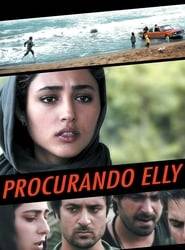
Após passar anos na Alemanha, Ahmad (Shahab Hosseini) volta ao Irã e seus amigos organizam três dias de comemoração. Sem que o resto do grupo saiba, Sepideh (Golshifteh Farahani) convida para a festa a jovem Elly (Taraneh Alidoosti), professora de sua filha. Ahmad, que acabou de se separar da namorada alemã e gostaria de começar uma nova vida com uma iraniana, vê em Elly a mulher perfeita. No dia seguinte, no entanto, ela desaparece misteriosamente. O clima entre os amigos torna-se amargo e tenso e eles iniciam uma pequena investigação para descobrir o paradeiro da moça.
0 notes
Text
[ ⚠️ WARNING: FLASHING VIDEO!!! ⚠️ ]
And I said, "hello Satan"
#me and the devil#soap&skin#audio#video#my edit#مدار صفر درجه#zero degree turn#madar-e sefr darajeh#hassan fathi#iran#france#TW: FLASHING VIDEO#shahab hosseini#golzar bahrami#1940s#2007#tw: blood
0 notes
Photo
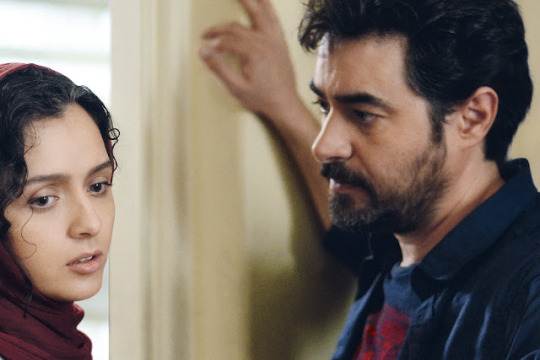
Taraneh Alidoosti and Shahab Hosseini in The Salesman (Asghar Farhadi, 2016)
Cast: Taraneh Alidoosti, Shahab Hosseini, Babak Karimi, Farid Sajadi Hosseini, Mina Sadati, Sam Valipour, Mojtaba Pirzadeh, Maral Bani Adam. Screenplay: Asghar Farhadi. Cinematography: Hossein Jafarian. Music: Sattar Oraki
Protesting an American policy that refuses to distinguish between artists and terrorists, Asghar Farhadi didn't attend the Academy Awards ceremony that gave his film The Salesman an Oscar for best foreign language film. The irony here is that in many ways The Salesman is as critical of the Islamic Republic of Iran as its director's action was of the United States. On the surface, The Salesman is a well-made domestic drama about the stress put on the marriage of Rana (Taraneh Alidoosti) and Emad (Shahab Hosseini) after Rana is assaulted in their own home. It's also a bit of a whodunit, as Emad tries to uncover the identity of the attacker, as well as a problem drama about the nature of revenge. But context is everything, and the context here is a country that seems to be as unstable as the condemned apartment house that Rana and Emad have to flee at the beginning of the film. Throughout The Salesman, the niggling pressures of a state determined to police the private lives of its citizens keep revealing themselves: The production of Arthur Miller's Death of a Salesman in which Emad and Rana play Willy and Linda Loman is subject to last-minute cuts demanded by the censors. The class Emad teaches is interrupted by a man telling him that the books he has selected have not been approved -- Emad wearily tells him to throw them in the trash. Worst of all, Rana refuses to trust the police to handle her case, knowing that she'd be subjected to interrogation and public exposure worse than the attack itself. We never learn the full details of what happened to her, whether she was sexually assaulted or just subjected to a terrifying visit from a voyeur -- although the latter, especially in a state that prescribes rigorous standards of modesty from women, is an equivalent violation. We get a hint of the tensions and mistrust between the sexes in Iran in a scene in which Emad shares a taxi with one of his male students and a woman, who first accuses him of what we'd call "manspreading," and then asks to change seats with the student. Afterward, when Emad proclaims his innocence, the student tells him that the woman had probably been molested by a man during a cab ride and is oversensitive to any contact. Official standards of behavior have eroded community standards: Although the apartment Rana and Emad have moved into was once occupied by a prostitute, a profession both strictly illegal and widespread in Iran, the neighbors only gossiped about her, never notifying the authorities. Emad's vigilantism when he discovers the identity of Rana's attacker is the product of a system of justice that has broken down. That Rana and Emad are actors is suggestive: In the film's vision of Iran, everyone is playing a part, concealing their real selves. The social and political subtext is what makes The Salesman a more fascinating and important film than its mere plot, well-handled as it is, would suggest.
1 note
·
View note
Text
Nargesi, Feature film, Iran (2021)
Key Cast: Shahab Hosseini
The film, Nargesi, which is based on a true story, is about a character named Hussein.
Struggles of a Human Being with down syndrome disorder whose greatest wish is to find love and get married and, in that pursuit, he attempts at doing anything. It seems, however, that the present-day world offers no place for him and his love until a gift completely turns his life around.
https://www.youtube.com/watch?v=nJEatFRmyHI
Payam Eskandari about Nargesi :
"When I was little, I witnessed moments of someone’s life whose main quest was to find true love, not pity. Unfortunately, he never found anyone to love him the way he would have wanted to.
At first, I didn’t understand why he couldn’t find love, until I reach a certain age. And I finally realized that people with down syndrome are not treated equally and no one believes they have true feelings like any other Human Beings.
An “illness”, a “medical condition”, a “disorder” or simply a difference that he was born with.
He is Hussein and he is my uncle.
From the day I finally acknowledged and understood who he really was, I promised myself that I would show Hussein’s beautiful and ugly facets of his life to the world and that I would do from his point of view (not mine nor anyone’s else).
Hussein taught me that you do not need a reason to greet, smile, dance or be happy"
Payam Eskandari, Director
Cannes 7th Art Awards 2021 (Cannes International Independent Film Festival -CIIFF)
INTERNATIONAL AWARDS
Best Actor in a Lead role:
Hussein Eskandri / "Nargesi" directed by Payam Eskandari / Iran
Best Actress in a Secondary role:
Shirin Aghakashi / "Nargesi" directed by Payam Eskandari / Iran
Grand Prize Feature Film:
"Nargesi" directed by Payam Eskandari / Iran
SILK ROAD AWARDS
Grand Prize Feature Film:
"Nargesi" directed by Payam Eskandari / Iran
#Editors_Pick#Films#Reviews#Teasers#films#iran#nargesi#payam_eskandari#reviews#shahab_hosseini#true_story#uncle
0 notes